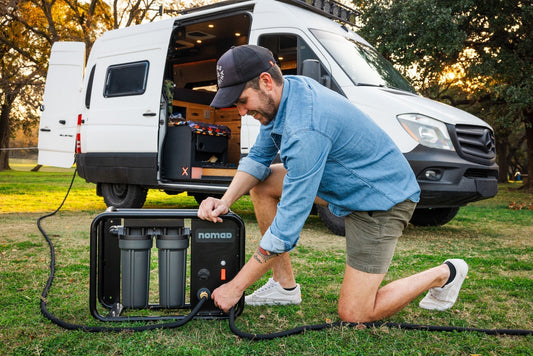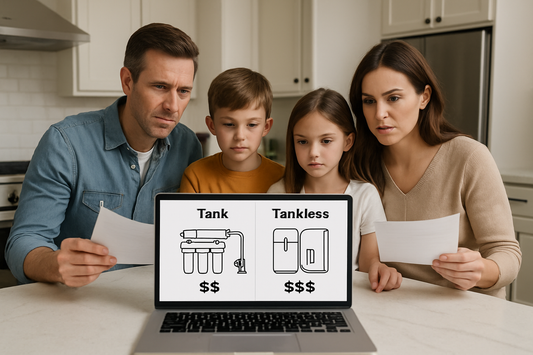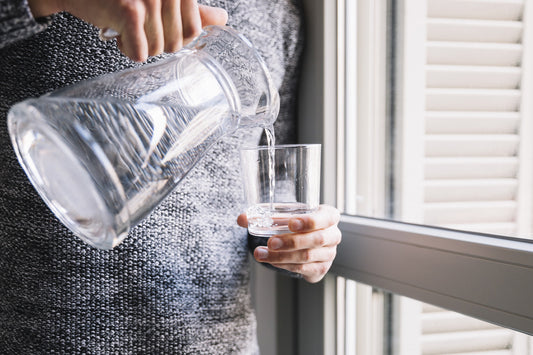The short answer: Different types of water filters target specific contaminants, and choosing the wrong one means you're still drinking what you're trying to avoid. Carbon filters excel at chlorine and taste issues, reverse osmosis tackles dissolved solids and heavy metals, while UV systems eliminate bacteria and viruses without chemicals.
The Hidden Cost of Wrong Water Filter Choices
Most homeowners pick water filters based on price or brand recognition, not realizing that each filtration technology targets different contaminants. Choose wrong, and you're essentially paying for clean water that isn't actually addressing your specific water quality issues.
The key lies in understanding what's actually in your water and matching it to the right filtration method. While Pelican Water Systems built a strong reputation for whole house solutions, today's market offers more targeted options from brands like Crystal Quest and Waterdrop that can better address specific contamination concerns.
Understanding Different Types of Water Filters
Activated Carbon Filters: The Taste and Odor Champions
What they remove: Chlorine, volatile organic compounds (VOCs), some pesticides, and taste/odor issues
What they miss: Heavy metals, dissolved minerals, bacteria, and viruses
Activated carbon works through adsorption - contaminants stick to the carbon surface like a magnet. These filters shine when your main concerns are chlorine taste, chemical odors, or basic organic compounds.
Best for: Municipal water with chlorine treatment, improving taste and smell
Limitation: Won't protect against microbial contamination or dissolved metals

Image by user36718402
Reverse Osmosis: The Heavy-Duty Purifier
What they remove: Up to 99% of dissolved solids, heavy metals, fluoride, nitrates, and most contaminants
What they miss: Some volatile organic compounds, requires pre-filtration for chlorine
Reverse osmosis forces water through an ultra-fine membrane, catching virtually everything larger than a water molecule. This makes RO systems the closest thing to universal water purification.
Best for: Well water with dissolved minerals, areas with heavy metal contamination
Limitation: Wastes 3-4 gallons for every gallon produced, removes beneficial minerals
UV Water Purifiers: The Chemical-Free Disinfector
What they remove: 99.99% of bacteria, viruses, and other microorganisms
What they miss: Chemical contaminants, dissolved solids, doesn't improve taste
UV light destroys the DNA of microorganisms, making them unable to reproduce or cause illness. It's like having a microscopic sterilization chamber for your water.
Best for: Well water with bacterial contamination, anyone avoiding chemical disinfection
Limitation: Requires electricity, needs pre-filtration for sediment
Ion Exchange Filters: The Water Softening Specialists
What they remove: Calcium, magnesium (hardness), some heavy metals
What they miss: Organic compounds, bacteria, chlorine
Ion exchange swaps "hard" minerals with sodium or potassium ions, effectively softening water and protecting appliances from scale buildup.
Best for: Hard water areas, protecting appliances and plumbing
Limitation: Adds sodium to water, requires regular regeneration

Distillation Systems: The Old-School Purifier
What they remove: Heavy metals, dissolved solids, most bacteria and viruses
What they miss: Some volatile organic compounds, energy-intensive process
Distillation boils water into steam, then condenses it back to liquid, leaving most contaminants behind. It's one of the oldest purification methods and still highly effective.
Best for: Severely contaminated water, areas with multiple contamination types
Limitation: High energy use, slow production, flat taste
Choosing the Best Whole House Water Filtration System
When considering whole house solutions, the best approach combines multiple technologies. Modern systems from manufacturers like Crystal Quest often integrate:
- Sediment pre-filters to protect downstream components
- Carbon filtration for chlorine and organic compounds
- KDF media for heavy metals and bacteria control
- UV sterilization for final microbial protection
This multi-stage approach addresses the widest range of contaminants while maximizing filter life and system efficiency.

System Comparison: What Works Where
| Water Issue | Best Filter Type | Secondary Option |
|---|---|---|
| Chlorine taste/odor | Activated Carbon | Whole house carbon |
| Hard water | Ion Exchange | Water softener combo |
| Well water bacteria | UV + Sediment | Chlorination system |
| Heavy metals | Reverse Osmosis | KDF + Carbon |
| Multiple contaminants | Multi-stage whole house | RO + UV combination |
Making Your Decision: Questions to Ask
What's actually in your water? Get a water test before choosing any system. Many filter choices fail because they don't match actual contamination.
What's your priority concern? Taste, health, appliance protection, or comprehensive purification? Different filters excel in different areas.
How much water do you use? Point-of-use filters work for drinking water, but whole house systems handle everything from showers to washing machines.
The reality is that most water issues require targeted solutions, not one-size-fits-all approaches. Understanding your specific water profile makes the difference between an effective system and an expensive mistake.
Frequently Asked Questions
Which water filter removes the most types of contaminants?
Reverse osmosis systems remove the widest range of contaminants, eliminating up to 99% of dissolved solids, heavy metals, and most chemical compounds, though they require pre-filtration for optimal performance.
Do I need a whole house water filter if I have city water?
Even treated municipal water can contain chlorine, lead from pipes, and seasonal contamination. A whole house system provides consistent protection and improves water quality throughout your home.
How do I know which filter type is right for my water?
Start with a comprehensive water test to identify specific contaminants, then match filter technologies to your actual water quality issues rather than choosing based on brand or price alone.
Can I combine different types of water filters?
Yes, multi-stage systems combining sediment, carbon, and UV or RO technologies provide the most comprehensive water treatment by addressing different contamination types in sequence.





